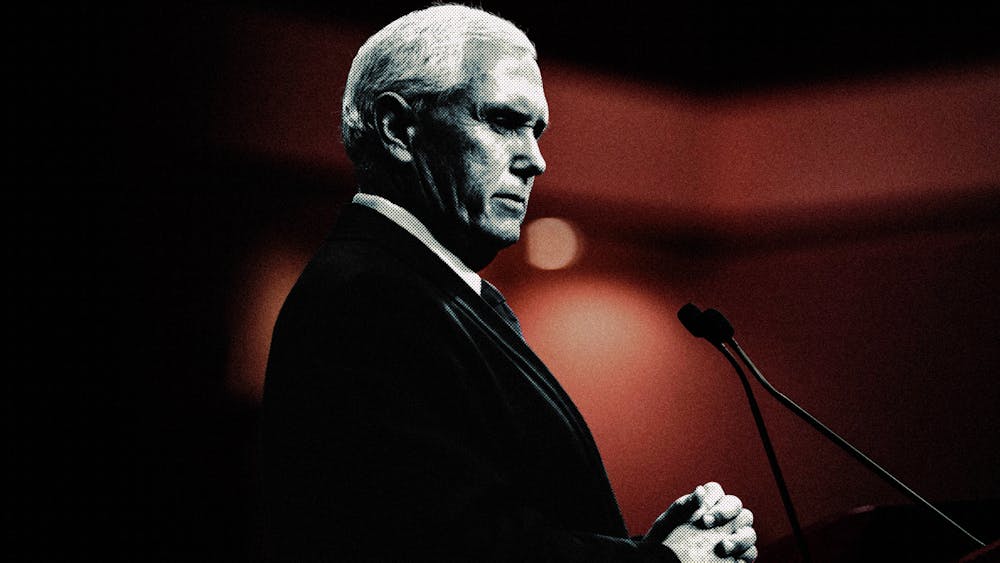
With the 2024 presidential election a year away, the Republican primaries are ramping up. As of Oct. 28, former Vice President Mike Pence is no longer running for president. It may have come as a surprise to many, especially since he dropped out of the race before the Iowa caucus, but his campaign was doomed from the start.
Pence officially declared his candidacy for president back in June, campaigning under the fact that he “chose the constitution” over Trump on Jan. 6, 2021. He attempted to appeal to voters as the man who would put no one over the constitution and decided to run against his former boss.
Pence’s polling numbers never reached a high enough percentage to be seen as a real threat to Trump. From the start of the campaign season, Trump has been the frontrunner in the Republican primary. After Pence’s interview with Tucker Carlson, his polling number went down almost two percentage points. The final days of Pence’s campaign he was polling less than 4%, while Trump was sitting at about 57%, which further shows that his campaign was far from victorious.
Although Pence’s campaign was never able to gain enough traction, I believe he deserves an applause for dropping out of the race early. Campaigns can be long and tedious, so dropping out early can benefit the candidate. Many presidential candidates run for a long time, although their campaign never polls enough. I believe that future and current presidential candidates should suspend their campaigns earlier on.
For example, in 2016, John Kasich’s campaign was always far behind Marco Rubio, Ted Cruz, and Donald Trump. Despite his low polling numbers, he campaigned until near the end of the election cycle. His main accomplishment was taking away electorates from Trump in Ohio. If he would have dropped out earlier, voters could have focused on supporting a different Republican candidate. Having many crowded fields takes away votes from the likely candidates.
Candidates do not know when to call it quits, but the vast majority of Americans know that their chances of winning are slim. Of course, no candidate should drop out of a race immediately; many campaigns gain some traction as they go, like Vivek Ramaswamy’s. That being said, if polling numbers never go up drastically, there's a clear favorite, and a campaign is fighting an uphill battle from the start, it may be best to sit the election out.
Oftentimes there are many candidates on a debate stage, causing them to get hectic. With so many candidates, it can be hard to understand each of their platforms. For example, in 2016, the debates for the Democratic nomination were between two candidates which allowed for two candidates to have an adequate time to explain their platform compared to the crowded republican field which minimized speaking time for each candidate. Personally, I prefer having two candidates debating their differences, instead of having a question-and-answer style debate with several candidates. Additionally, voters who support a candidate who drops out a week before their state’s primary may have to scramble to pick a new candidate. Candidates with sub 5% in polling mostly serve to take away votes from other candidates. Voters feel that their vote was wasted when they vote for a candidate who drops out. By having fewer long-shot candidates, the political party can put its support into one candidate.
Running against a president, or in this case former president, is not easy. That is why, most times, incumbents (or in this case, former presidents) do not have any big challengers from their own party. At first, people may have believed that Trump would be the only one running, but many stepped up to challenge him. As of November, Trump is the frontrunner with Ron Desantis, Nikki Haley, and Vivek Ramaswamy behind him. It will be interesting to see how the Republican primaries go and if any candidate can be a serious threat to Trump. With a year to go before the election, nobody knows for certain how the race will go, especially with Trump’s legal issues. Perhaps this time next year, we may see the Wharton alumnus running against Biden, or maybe somebody else. Although we may not know how this race will end, it is pretty safe to say that Trump will not be asking Pence to be his vice president.
ERIC NAJERA is a college sophomore studying history from Rolling Meadows, Ill. His email is najerae@sas.upenn.edu.
The Daily Pennsylvanian is an independent, student-run newspaper. Please consider making a donation to support the coverage that shapes the University. Your generosity ensures a future of strong journalism at Penn.
Donate






